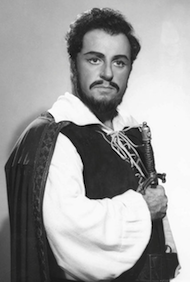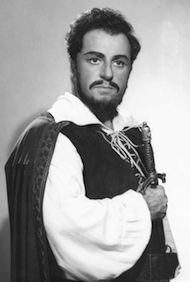
Photo by Louis Mélançon/Metropolitan Opera
Even among the greatest tenors of the last century, there was something unique about Carlo Bergonzi, who died on Friday in Milan at ago 90. There was an unrivaled elegance in his voice, he always felt the music, his singing was consistently effortless and beautiful. His San Francisco appearances were few but memorable: Don Alvaro in the 1969 La Forza del Destino, Gustavo in the 1985 Un Ballo in Maschera, and a recital in 1986.
Neither his appearance nor the power of his voice made him the star he was. As Peter G. Davis is quoted in The New York Times obituary:
More than the sound of the voice, it is Mr. Bergonzi’s way of using it that is so special. He is a natural singer in that everything he does seems right and inevitable — the artful phrasing, the coloristic variety, the perfectly positioned accents, the theatrical sense of well-proportioned climaxes, the honest emotional fervor. Best of all, Mr. Bergonzi obviously uses these effects artistically because he feels them rather than intellectualizes them — a rare instinctual gift, possibly the most precious one any musician can possess.
Of his looks — "more like the neighborhood butcher than, say, the dashing Duke of Mantua" — Bergonzi said:
I know I don’t look like Rudolph Valentino. I know what a proper physique should be for the parts I sing, but I have tried to learn to act through the voice. The proper, pure expression of the line is the most important thing.
It is that pure, wonderful line that can be heard in Bergonzi's "Una furtiva lagrima," his "Questa o quella,", "E lucevan le stella," or any of his recordings, even late in a glorious career.
In live performances, even in response to a failed comeback in 2000, loving respect for Bergonzi still prevailed, such as in Martin Bernheimer's Financial Times review, a blast at the event itself, but recalling the past:
He sang with unfailing beauty of tone, with discerning taste, with rare elegance, irresistible sweetness and reassuring warmth. He was uncommonly poised yet poignant as Riccardo, elementally sad as Canio the betrayed clown, endearingly whimsical as Nemorino, the hapless hick. Other tenors looked like matinee idols; he was rather portly. Some colleagues were convincing actors; he was usually content to stand and sing. Others sang higher and louder; his heroism always came on a human scale. Yet this man knew his limitations, and made the most of his strengthsUnlike most rivals, he cared enough about the score to attempt the trills in Verdi’s Il trovatore, and he respected the composer’s dynamic instructions enough to file the climactic B-flat of “Celeste Aida” down to a shimmering pianissimo. Most tenors are singers. This one was an artist.

